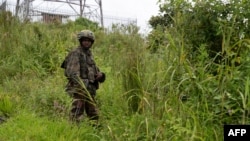The U.S. has condemned Saturday Rwanda's support of the armed M23 group in eastern Congo, whose rebellion has caused the displacement of hundreds of thousands of people, and called on the rebel group to “cease hostilities.”
The U.S. State Department in a statement strongly criticized “the worsening violence ... caused by the actions of the Rwanda-backed, U.S.- and UN-sanctioned M23 armed group.” It called on Rwanda "to immediately withdraw all Rwanda Defense Force personnel from the [Congo] and remove its surface-to-air missile systems,” which it said threatened civilian lives and peacekeepers. It also urged the rebels to retreat from their current positions near two urban areas in Congo’s North Kivu province.
This is likely to put pressure on Rwanda, whose government has repeatedly denied any links to the M23 group.
Congolese President Felix Tshisekedi has accused Rwanda of destabilizing Congo by backing the rebels. U.N. experts previously said they had “solid evidence” that members of Rwanda’s armed forces were conducting operations there in support of the M23 group.
Fighting near Goma, the capital of North Kivu province and the largest city in the region, has intensified in recent days as the rebels threatened to take over the metropolis. Residents of the nearby town of Sake have been fleeing fierce fighting between Congolese government troops and the group.
The armed conflict has so far displaced more than one million people in eastern Congo since November, according to the aid group Mercy Corps.
Many M23 fighters, including Congolese Tutsis, were once members of Congo's army. The group's leaders say they are fighting to protect local Tutsis from extremist Hutu groups such as the Democratic Forces for the Liberation of Rwanda, whose members were among the perpetrators of the 1994 genocide in Rwanda.
M23 is one of more than 100 armed groups active in eastern Congo, seeking a share of the region’s gold and other resources as they carry out mass killings.
The rebel group rose to prominence just over a decade ago when its fighters seized Goma, which borders Rwanda. It derives its name from a March 23, 2009, peace deal which it accuses the Congo government of not implementing. After being largely dormant for a decade, the M23 resurfaced in late 2021.
The U.S. statement urged all sides to de-escalate and to “participate constructively in reaching a negotiated solution” to the conflict.
“It is essential that all states respect each other’s sovereignty and territorial integrity and hold accountable all actors for human rights abuses in the conflict in eastern [Congo],” it said.




